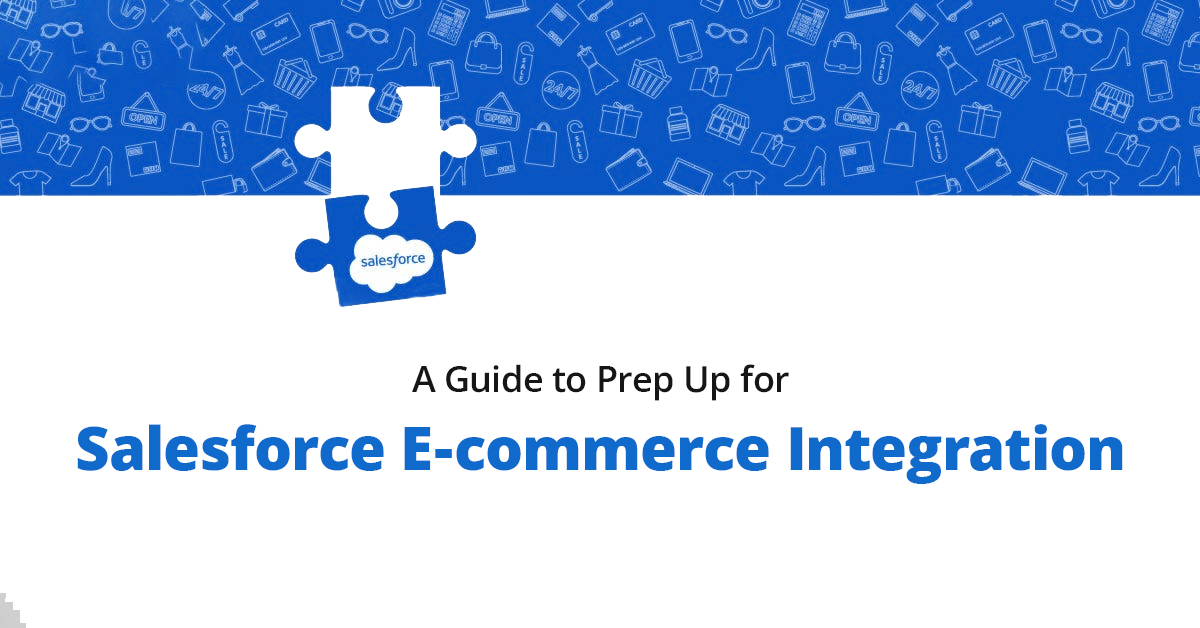Salesforce E-commerce Integration: A Guide by Salesforce Integration Services in the USA
25 Aug 2023
Table of Contents

Any e-commerce business looking to boost its sales and productivity should definitely have Salesforce on its radar. With companies wishing for a strong web presence backed by the latest technologies, the demand for Salesforce integration services in the USA has definitely increased.
E-commerce is surely a long-term strategy for businesses, as studies have shown that the e-commerce market is expected to total over $8.1 trillion by 2026.
The customer segment for any e-commerce business usually has some common expectations, like the business should know their expectation, the service team should be accessible, easy to track and manage orders, etc. But on the company side, managing so many operations while meeting customer expectations can be difficult. That’s something Salesforce e-commerce integration can make easier.
Table of Contents
Why Should You Consider Salesforce E-commerce Integration?
The market for e-commerce is expanding. This has made it essential for firms to obtain a competitive edge that will make them closer to customers. And when it is about integrating Salesforce with the e-commerce platform, the benefits can be enhanced.
So, to understand the value of Salesforce e-commerce integration services in the USA, let’s go through some of these reasons for businesses to consider it.
1. Enable added intelligence
Customer data is the real wealth for e-commerce businesses. How they record and use data matters a lot in building strategies to make more sales. E-commerce firms have a lot of customer data gathered from multiple sources and channels, which will only be beneficial when analyzed and used in the right way.
With Salesforce integration, e-commerce businesses can leverage the power of AI-backed features and access analytics from data. This would enable the sales team to understand customers better and personalize the shopping experience at every touchpoint in the customer journey.
2. Access the best marketing tools easily
Salesforce integration allows the teams to manage all your business and customer data in one place. Any e-commerce business would probably be using multiple tools like MailChimp or Google Analytics. Integrating the platform with Salesforce would enable the team to access data from all third-party tools within Salesforce.
Being able to access all marketing tools within one unified platform increases collaboration between teams and enhances overall efficiency. It will also enable teams to manage and share information like different websites with different currencies and products.
3. Optimize your online store for mobile
About 79% of smartphone users prefer making their online purchases through their mobile phones. Interesting, isn’t it?
Being able to follow a mobile-first approach is one of the most appreciated benefits of integrating an e-commerce platform with Salesforce. It helps to enhance user experience over mobile devices, thus increasing engagement and sales.
Not just for customers, enabling mobile shopping with the help of Salesforce integration services in the USA would even allow merchants to manage inventory and other information over their mobile devices, making it easier to manage everything when they’re out of the office.
4. Access omnichannel functionalities
Integrating Salesforce with e-commerce platforms enables teams to streamline multiple processes and manage everything through a single platform. Processes like sales order management, inventory management, social campaigns, and all other activities can be handled through a single platform.
Any e-commerce company would have been running multiple marketing campaigns on multiple channels, making it difficult for the team to manage the siloed information. But when you are managing your e-commerce operations on Salesforce, you can easily access omnichannel functionalities.
With the help of Salesforce integration services in the USA, you can keep track of all your information and operations on different channels within a unified platform. The integration is thus a time-saver for teams at e-commerce firms, eliminating all the toggling between systems.
5. Work with Salesforce Einstein
With Salesforce taking more and more initiative to adapt AI and its features to enhance user experience, even e-commerce businesses can’t miss out on the benefits they can achieve with Einstein AI.
74% of customers end up being frustrated when the website content is not personalized for them.
Leveraging Einstein can enable teams at e-commerce businesses to analyze insights about customers and send out personalized recommendations. This helps eliminate the need for third-party applications to perform data analysis, making Salesforce the one-stop solution for all operations.
E-commerce solutions integrated with Salesforce help teams leverage multiple features like:
– Suggest the best-performing products on multiple channels
– Send out 1:1 personalized recommendations to customers
– Use data-driven approaches to improve conversion rates.
All these features enhance the power of personalization, helping teams to get closer to the target audience.
Integrate your Current E-commerce Platform with Salesforce Now
With increasing competition, merchants and retailers are in dire need of boosting their capability to reach the right audience with the right products and services. Even while they use the best tools to improve processes, managing those tools altogether can be a task. With a trusted Salesforce integration company, you can get your e-commerce platform synchronized with Salesforce, enabling teams to handle all your e-commerce operations over a unified platform.
It’s time to leave the constant struggle of switching between applications and get a centralized view of all. Contact us and talk to our experts to know the successful integrations we’ve achieved for our clients.
Quiz Time
How are the majority of e-commerce users making their purchases?
a). Preferring in-store visit
b). Using desktop
c). Connecting over calls
d). Using mobile devices
Show Answer: c) Using mobile devices
FAQs
Why do e-commerce businesses prefer Salesforce Commerce Cloud?
From order management to secure payment processing, there are numerous aspects that an e-commerce business has to take care of. Managing all those operations through different applications would take up a lot of time and effort. That’s where Salesforce Commerce Cloud can be a time-saver for teams. With Commerce Cloud, teams can derive multiple benefits like: – Identifying customer interest and changing market trends to plan marketing campaigns – Access sophisticated tools for different aspects, for example, email marketing, personalization, A/B testing, etc. – Facilitate mobile-first experience to reach more customers – Boost customer support over multiple channels
Which are the most popular e-commerce platforms that can be integrated with Salesforce?
Salesforce integration has given many e-commerce businesses an ease to get the power of CRM while improving their current operations and efficiency. There are different platforms that can support the integration: Shopify: The platform is used by many small and large businesses. Integrating Shopify with Salesforce is enabling businesses to get a professional-looking storefront while enhancing the ability of the platform to run efficient marketing campaigns. WooCommerce: Companies are actively using WooCommerce to transform a single WordPress website into a complete e-commerce store. Being free, it is a popular choice for businesses as it supports different extensions like WooCommerce Salesforce integration. Magento: Businesses that have the potential to scale are actively using Magento for their e-commerce operations. It’s simple to set up for teams and can be easily extended with Salesforce integration.
About the author
Editorial Team – 360 Degree CloudThe Editorial Team at 360 Degree Cloud brings together seasoned marketers, Salesforce specialists, and technology writers who are passionate about simplifying complex ideas into meaningful insights. With deep expertise in Salesforce solutions, B2B SaaS, and digital transformation, the team curates thought leadership content, industry trends, and practical guides that help businesses navigate growth with clarity and confidence. Every piece we publish reflects our commitment to delivering value, fostering innovation, and connecting readers with the evolving Salesforce ecosystem.
Recent Blogs
 Salesforce Services
Salesforce Services
Top Salesforce Consulting Firms in the USA: How to Choose the Right Partner
Do you know 70% of customer Salesforce implementations are conducted by Salesforce consulting partners? This number clearly indicates how important Salesforce consulting firms are for businesses that…
Read More Salesforce Services
Salesforce Services
How to Eliminate Productivity Bottleneck with Spring ‘26 Release
For firms built on the Salesforce ecosystem, Spring ’26 Release is more than just a software update. It is a strategic pivot point that directly affects how fast teams move, how cleanly they operate, and…
Read More Uncategorized
Uncategorized
Why BFSI Automation Is Shifting From Workflows to AI Agents
Banking is not losing to fintech because it lacks features. It is losing time in execution. A customer uploads KYC docs, but the verification queue is backlogged. A fraud…
Read MoreReady to Make the Most Out of Your Salesforce Instance?
Our Salesforce aces would be happy to help you. Just drop us a line at contact@360degreecloud.com, and we’ll take it from there!
Subscribe to our newsletter
Stay ahead with expert insights, industry trends, and exclusive resources—delivered straight to your inbox.





